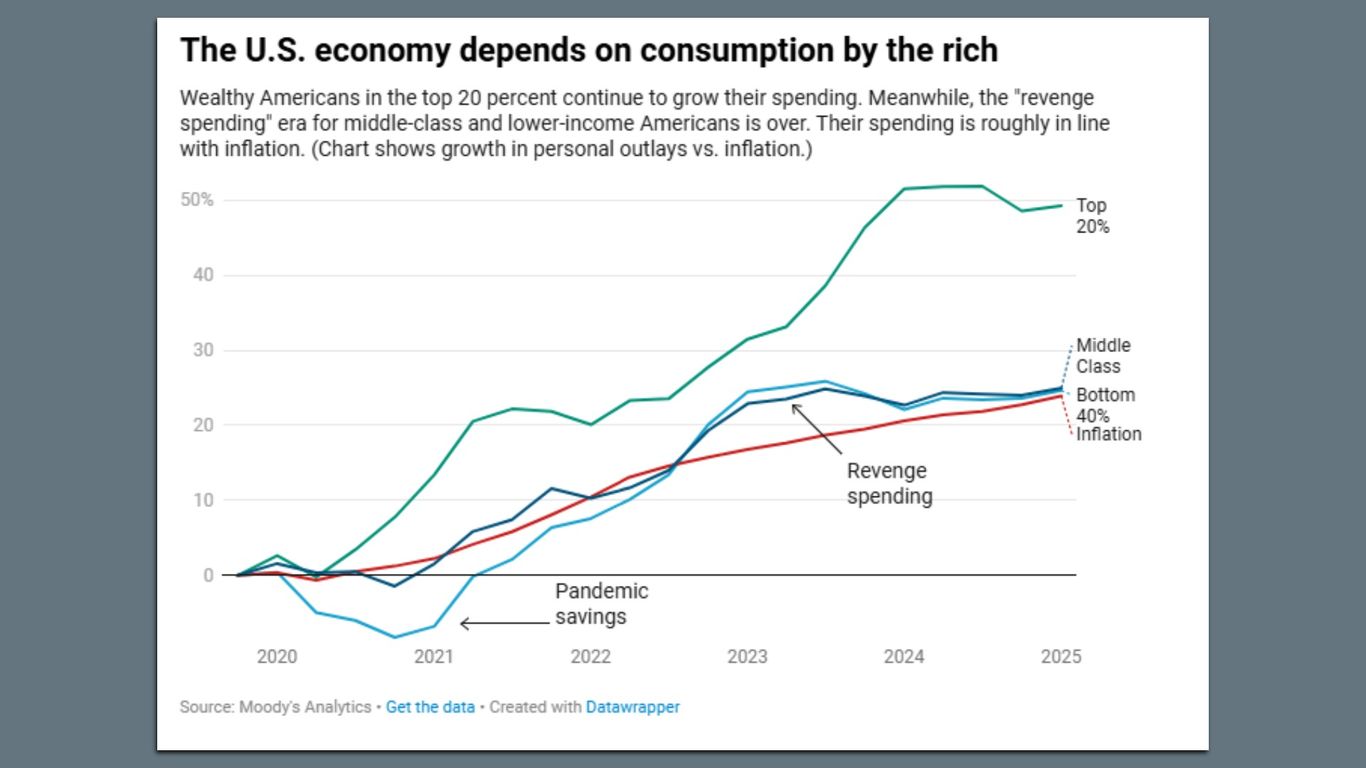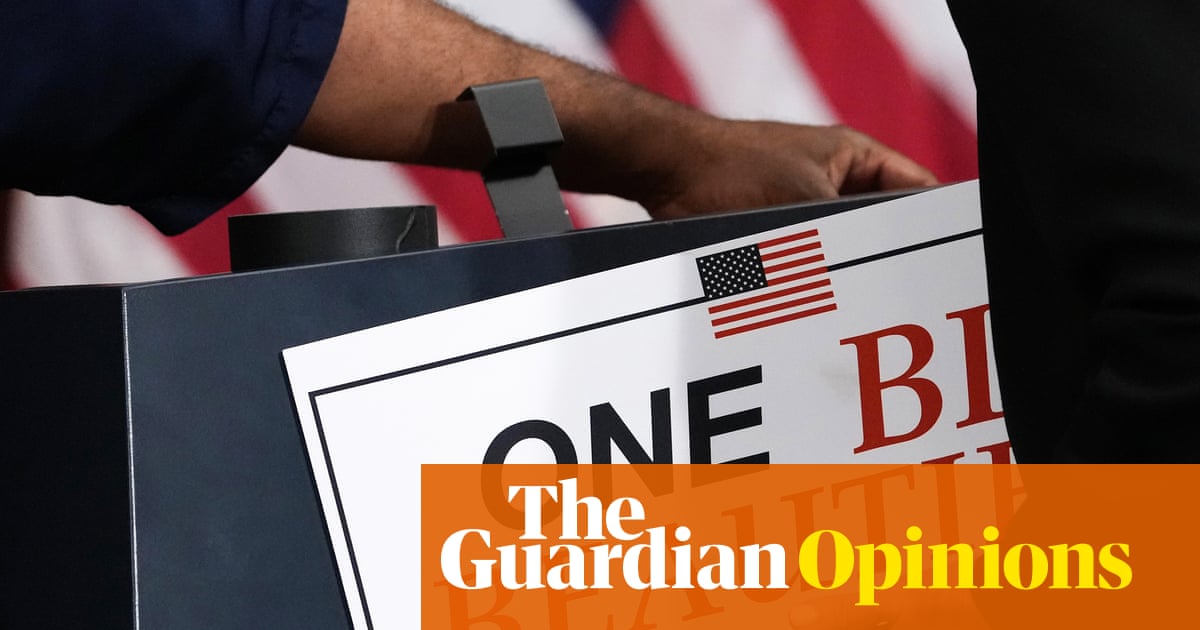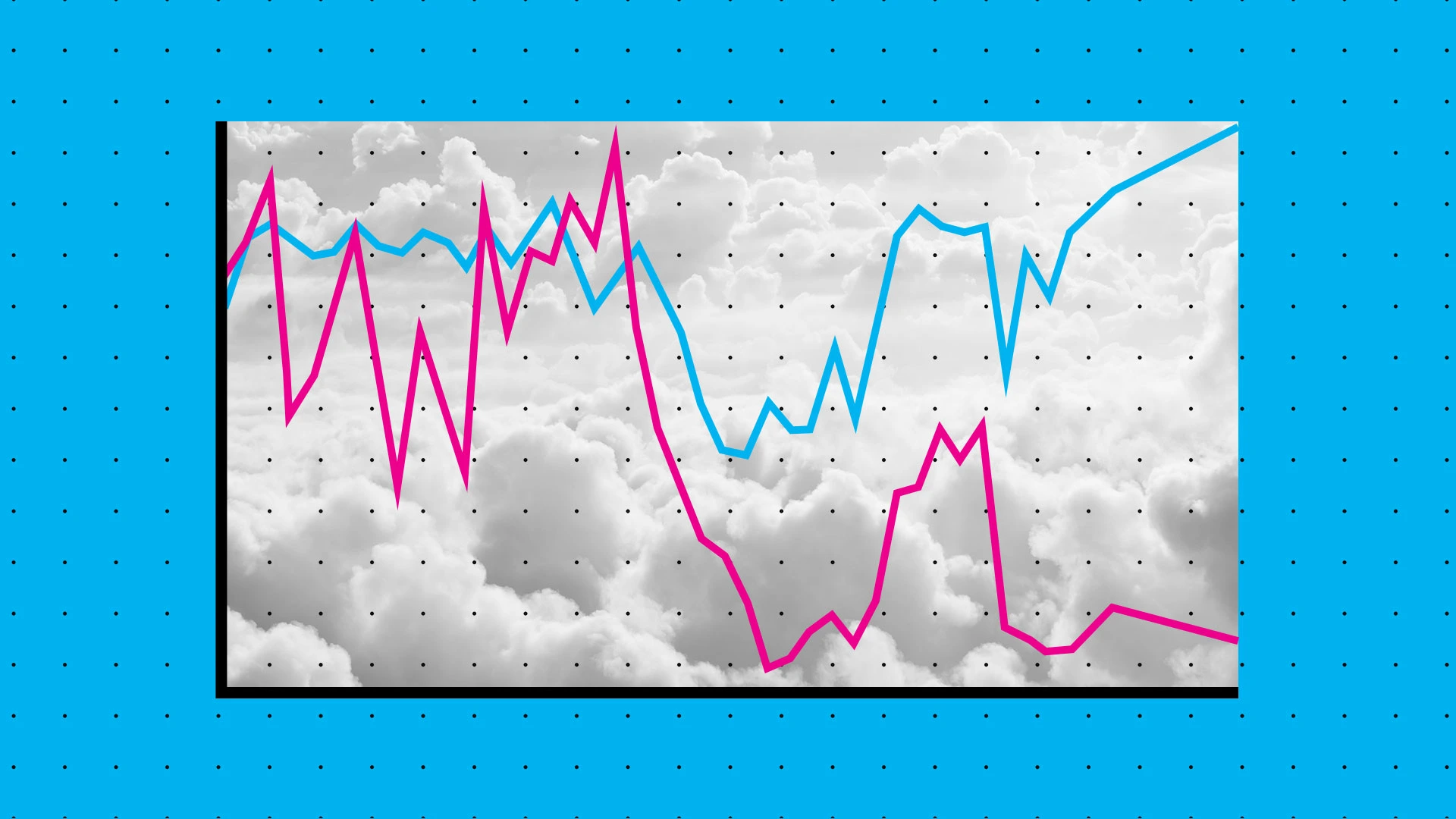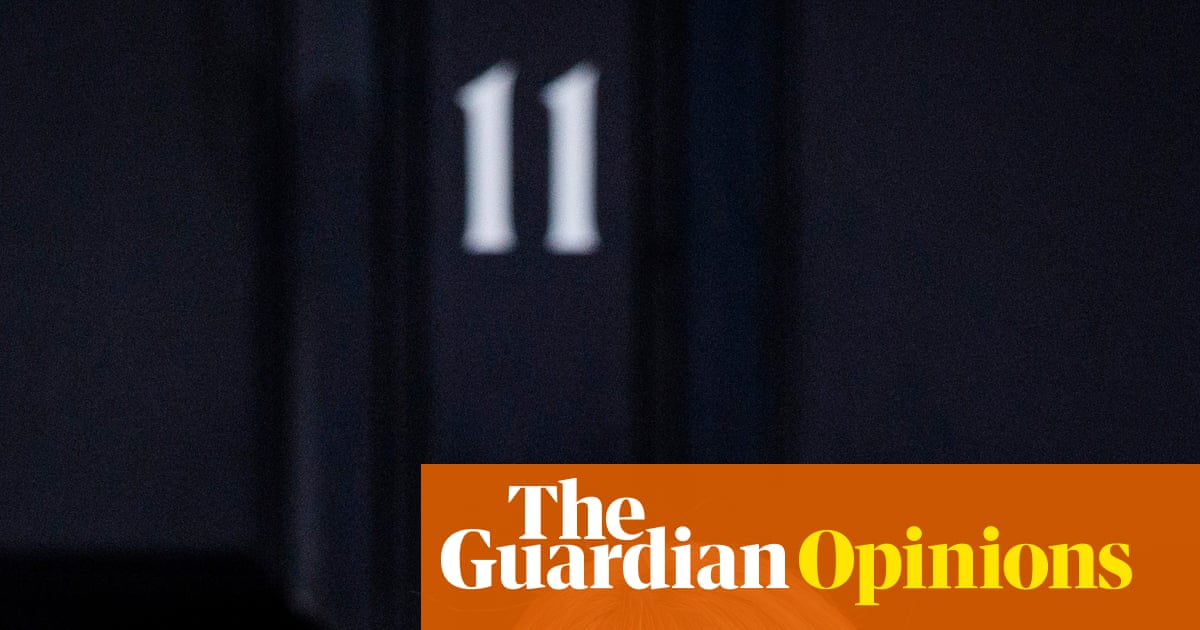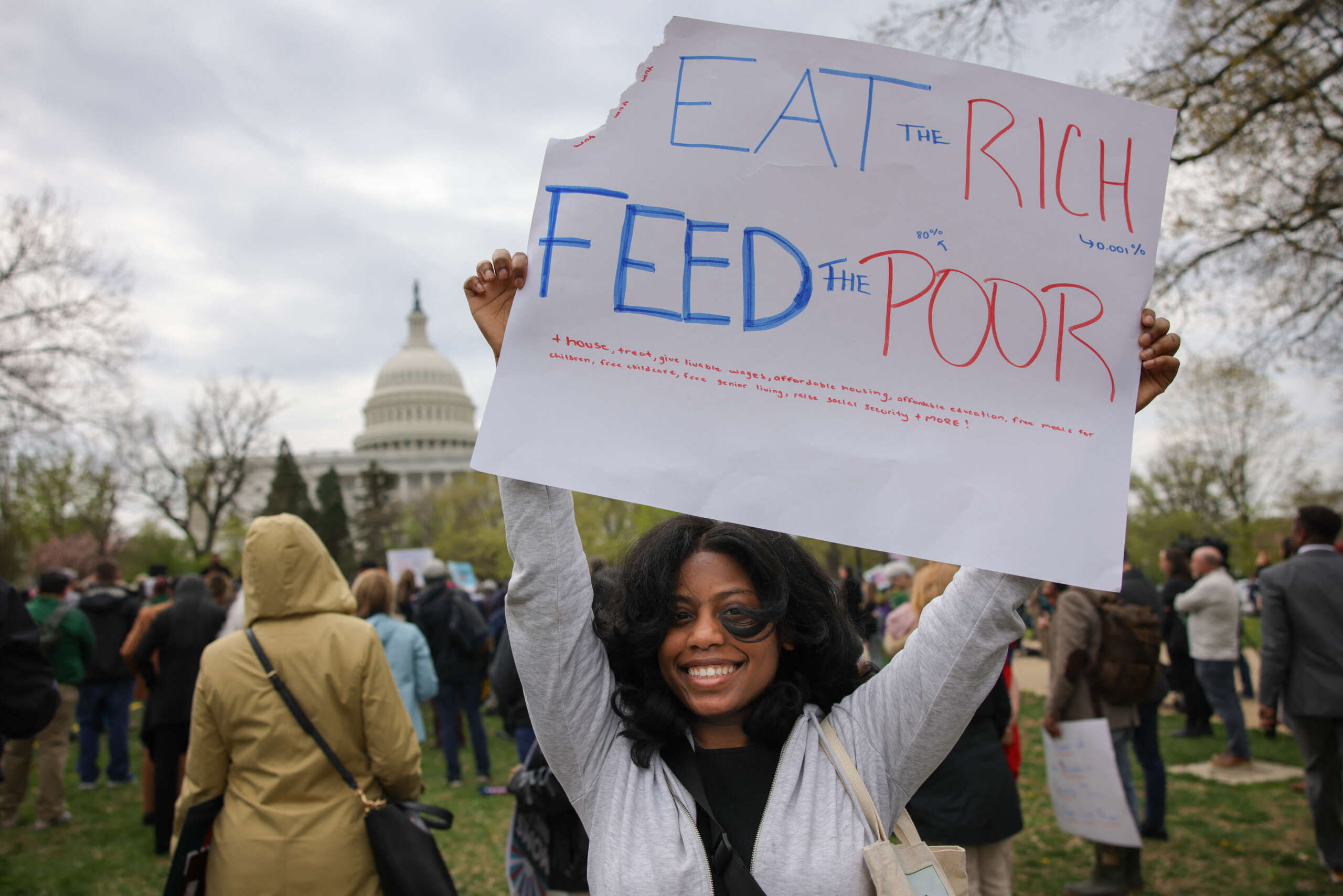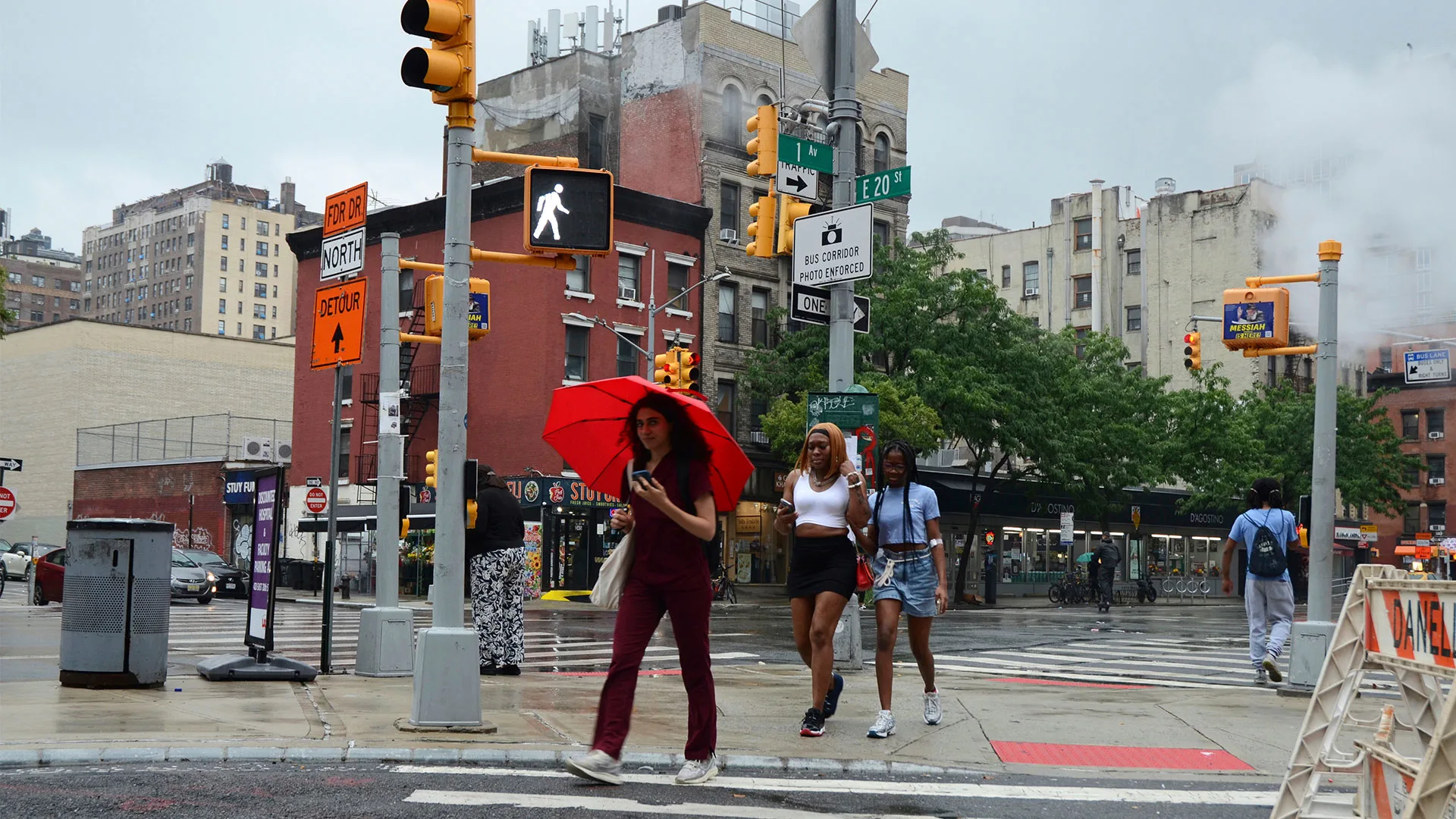#income-inequality
#income-inequality
[ follow ]
#consumer-spending #inflation #k-shaped-economy #labor-market #housing-affordability #ceo-compensation
US politics
fromBusiness Insider
2 days agoTrump's former chief economic advisor says workers are 'suffering' in America's K-shaped economy
The US economy shows robust overall growth while many Americans face acute affordability struggles, widening wealth gaps and shifting political focus ahead of midterm elections.
fromAxios
6 days agoThe 3 groups lagging most in America's post-COVID rebound
The latest Census data also suggest the next phase of U.S. politics will be shaped less by a single national economy than by who benefited from growth and where they live. By the numbers: The U.S. median household income rose to $80,734, the 2020-2024 American Community Survey released Thursday and examined by Axios showed. That's a 4.4% jump from 2015-2019 after inflation.
US politics
US politics
fromFortune
2 weeks agoJamie Dimon says he'd have no issue paying higher taxes if it actually went to the people who need it-right now it just goes to the Washington 'swamp' | Fortune
Double the earned income tax credit as a negative income tax, funded by higher taxes on the wealthy, to increase spending for lower-income households.
fromBusiness Insider
2 weeks agoDo you trust AI enough to stop saving for retirement?
You can't completely discredit Musk's take, though. Yes, forgoing retirement on the belief that AI and tech will just figure it out in a few decades is a massive gamble. But the past few years have reminded us that tech can quickly flip the script on conventional wisdom. Five years ago, a career as a computer programmer felt secure. Now ... not so much.
Artificial intelligence
New York City
fromwww.amny.com
1 month agoZohran Mamdani's inauguration: New mayor vows not to soften democratic socialist agenda for governing NYC amNewYork
Zohran Mamdani pledges to govern New York City as a democratic socialist and implement bold policies tackling inequality, housing, childcare, and public transit.
fromJezebel
1 month agoGambling Is Ubiquitous Because People Know America Is a Scam
The dirty secret many now understand is that a lot of wage labor is not enough to get by in America anymore. The past promise of working hard for 40 hours per week and getting a home and a retirement in return is gone for a significant chunk of this country, stripped away by capitalists whose only desire in their miserable lives is to have more than they currently do.
US politics
Artificial intelligence
fromwww.theguardian.com
1 month agoMost people aren't fretting about an AI bubble. What they fear is mass layoffs | Steven Greenhouse
AI-driven automation risks causing massive job losses, particularly among entry-level white-collar workers, potentially worsening unemployment and income inequality.
Digital life
fromIndependent
2 months ago'There was one lean month this year where I could only pay myself 100' - how much money are influencers really making?
Top influencers can earn millions while most content creators earn less than minimum wage and face privacy invasion, emotional harm, and unstable income.
UK news
fromBusiness Matters
2 months agoDisposable income falls for fourth consecutive month as one in five Brits can't cover essential bills ahead of Reeves' Budget
One in five UK households cannot afford weekly essential bills as disposable income falls and low- to middle-income families face growing shortfalls.
fromenglish.elpais.com
2 months agoThe rich marry the rich: How love perpetuates inequality
Social class permeates all aspects of life, and love is no exception. In Spain, for instance, couples don't form randomly; rather, they're typically determined by socioeconomic factors. This means that people tend to partner with those most similar to themselves in terms of income and wealth. And, at the top of the social ladder, this tendency intensifies. Those who earn and have the most assets find each other with a frequency three times greater than would occur in a society where relationships were completely random.
Relationships
fromFortune
2 months agoTop analyst sees 'genuine cracks for mid- to lower-end consumers' as the K-shaped economy continues to bite | Fortune
The narrative surrounding the "resilient U.S. consumer," which has been a major upside surprise in 2025, is now facing significant headwinds, according to the Global Investment Committee (GIC) at Morgan Stanley Wealth Management. While consumer spending has maintained a steady nominal growth rate of 5% to 6%, underpinning a bullish outlook for US equities in 2026, the GIC is expressing caution. Lisa Shalett, chief investment officer and head of the GIC, warned that although the broader macroeconomic picture remains cautiously optimistic, the "K-shaped" economy demands greater scrutiny.
US news
fromFortune
2 months agoThe K-shaped economy has come for your wages, as lower-income Americans sees their gains plummet to the weakest rate in a decade | Fortune
A decade ago, low-income workers saw wages grow at the highest rate of any Americans. Now, the opposite is true, and the gap is widening between how quickly wages increase for wealthy and poorer U.S. households. In a Monday blog post titled "K-shaped economy," Apollo chief economist Torsten Slok warned the growing disparity is yet another sign of today's economy continuing to serve the rich, while poor Americans continue to struggle.
US news
Business
fromFortune
2 months agoUlta Beauty CEO Kecia Steelman went from earning $8 an hour to running the U.S.'s largest beauty retailer | Fortune
Government shutdown-related SNAP payment disruptions cost stores revenue, harm low-income households, and underscore how U.S. consumer spending and transfers sustain the economy amid rising inequality.
US politics
fromwww.mediaite.com
3 months agoJon Stewart Rips Trump's Great Gatsby-Themed Ode to Decadence and Hedonism': Even Jeffrey Epstein Would Have Thought' It Was Too Much
Trump hosted a Great Gatsby-themed Mar-a-Lago party as SNAP benefits ended, drawing criticism for celebrating decadence amid rising hardship and income inequality.
fromwww.theguardian.com
3 months agoThe Guardian view on Britain's new class divide: the professional middle is being hollowed out | Editorial
An Oxford don in charge of mathematical finance told its reporters that almost all his students ended up working at quant trading firms, on salaries from 250,000 to 800,000. If you get offered a salary less than 250K, you're kind of the sad guy, he said, adding that nobody I know interviews for JPMorgan, Goldman Sachs not once do I hear anybody entertain any of these traditional investment banking jobs.
UK politics
US politics
fromwww.npr.org
3 months agoIn 'Fight Oligarchy,' Sen. Bernie Sanders calls for a political revolution
Oligarchic control and billionaire influence have corrupted U.S. politics, producing extreme inequality and necessitating a working-class–centered political revolution and community mobilization.
fromBoston Condos For Sale Ford Realty
3 months agoBoston Condos For Sale And The Two-tier Economy Boston Condos For Sale Ford Realty
For high-income consumers ("the haves"): Strong spending power: Wealthy consumers are buoyed by high asset prices in stocks and real estate. The market melt-up, fueled by investments in areas like artificial intelligence, has increased their net worth. Insulation from interest rates: These individuals are less affected by higher interest rates, allowing them to continue spending on both luxury items and daily goods. Confidence in the economy: Their financial confidence remains strong, leading to continued investment and consumption.
Business
US politics
fromFast Company
3 months agoThe biggest U.S. companies on the S&P 500 spent more than $1 trillion on stock buybacks and dividends in 2024
Major U.S. corporations prioritized over $1.6 trillion in 2024 for buybacks and dividends, outpacing taxes and diverting funds from wages and sustainable investments.
Mental health
fromwww.theguardian.com
4 months agoStudy links greater inequality to structural changes in children's brains
State-level income inequality associates with reduced cortical surface area and altered brain connectivity in children across socioeconomic backgrounds, and links to poorer mental health.
Business
fromFortune
4 months agoEntrepreneurs can make up to 70% more than paid employees per year, but there's high inequality among the self-employed | Fortune
Entrepreneurs start with lower incomes but surpass employees by age 30 and earn substantially more by career stage, with high inequality concentrated among top earners.
fromenglish.elpais.com
4 months agoThe social elevator is breaking down in Spain, one of the richest countries with the greatest inequality of opportunity
Economists have long warned that the upward climb has slowed to a near standstill. Now the OECD has provided figures that reinforce this perception: in Spain, more than a third of income inequality is determined by factors that do not depend on the individual, but rather on imposed or inherited circumstances such as gender, the parents' place of birth, or, above all, their socioeconomic background.
Miscellaneous
fromwww.mercurynews.com
4 months agoWalters: California's sky-high costs afford it highest poverty label again
Last year's presidential election underscored, particularly to Democrats, that the costs of living were a major factor in the outcome. Inflation had increased sharply during Joe Biden's presidency, and voters' angst about rising prices worked against Vice President Kamala Harris' campaign to succeed him in the White House. Not surprisingly, therefore, when the California Legislature opened its 2025 session, its dominant Democrats declared that they would focus on taming the state's notoriously high costs for housing, fuel, utilities and other necessities of modern life.
California
Left-wing politics
fromwww.mediaite.com
4 months agoTwitch Star Hasan Piker: 'Capitalist Way of Life' Contributed to Charlie Kirk Shooting
The murder of a high-profile conservative content creator reflects social breakdown driven by capitalism, worsening material conditions, isolation, resentment, and a 24/7 news cycle.
New York Islanders
fromwww.aljazeera.com
4 months agoSanders, Mamdani rally progressive voters as NYC mayor's race intensifies
Zohran Mamdani, a progressive frontrunner in New York City, prioritises tackling income inequality and affordability while drawing national attention and support alongside Bernie Sanders.
fromMission Local
5 months agoHundreds march in S.F. Labor Day rally to protest 'billionaire takeover'
Many hundreds of people marched from the 16th St. BART Station to Dolores Park Monday at noon in a "Workers Over Billionaires" march that took aim at everything from President Donald Trump to Immigration and Customs Enforcement to Israel's actions in Gaza. Participants talked about general fear of the country's direction, the plight of immigrants and the feeling of living in troubled times.
US politics
fromTruthout
5 months agoAs CEO Compensation Soars, Everyone Else Gets Left Behind
Starbucks is the worst offender, but jaw-dropping gaps are the norm among America's leading low-wage corporations. CEOs of the 100 S&P 500 firms with the lowest median wages - a group I call the "Low-Wage 100" - have enjoyed skyrocketing pay over the past six years. As a group, these CEOs now earn 632 times more than their median employees, I found in a new report for the Institute for Policy Studies.
Business
[ Load more ]





